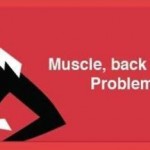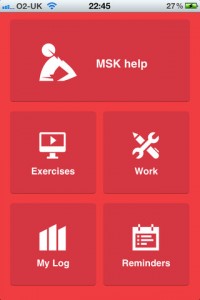
This week sees the launch of a free app specifically designed to provide the public with key advice and information to help them manage their musculoskeletal problem themselves in the palm of their hand. It has been developed to compliment the web resources published last year by Scotland’s ‘NHS24’ and ‘daughter’ organisation ‘NHS inform’, the national health information service for the public in Scotland.

The app provides advice on common muscle, back and joint problems and exercises and video clips to help you get moving safely.
The online tools were developed by NHS 24 in partnership with the Scottish Centre for Healthy Working Lives. The app provides advice on common muscle, back and joint problems and exercises and video clips to help you get moving safely. It also provides options to set reminders to do your exercises and/or attend any appointments and a log to keep a note of your progress. The app also contains a specific section on work, including links to employability services, the Scottish Centre for Healthy Working Lives and healthy eating advice.
The app also features content from other NHS 24 online resources, such as an MSK education website that was launched last December that has already attracted more than 40,000 hits. The site features video podcast presentations from some of the world’s leading experts in the fields of red, yellow, blue and black flags, including physiotherapists Professor James Selfe and Sue Greenhalgh.
But why invest healthcare professional time and public money in an app?
We know that access to the right advice and information hastens recovery, reduces demand on health services and keeps people at work or doing their normal daily activities. The popularity of mobile devices is obvious and now as much a part of everyday living as cleaning your teeth. In fact, according to the latest research more consumers in the UK, US, Germany, France and Japan use a mobile phone (feature phone or smartphone) than a computer (desktop or laptop). Almost a third (30%) of mobile phone owners worldwide are smartphone users with the UK showing the largest increase in smartphone usage from 30 to 45% of the total population. The demographics of smartphone owners are also shifting. Smartphone usage among females and those aged 45+ has increased. Take-up has been fast with 59% purchasing their smartphone in the past year. We also know that consumers are increasingly using their smartphones for Internet access with over half of smartphone users in the UK accessing the mobile Internet daily. So with this knowledge, why would we not?
Historically, healthcare professionals have provided advice face to face, commonly sending their patients away with leaflets or photocopied sheets of varying quality. We know that for most MSK problems that they get better but knowing that and how best to hasten that process is key. We believe that we have a public duty to provide the right information at the right time and in the way people access any other information key to running their busy lives. We also believe that we have to exploit the technology available and people use. Most think nothing of looking up the times of trains, cinema viewings or accessing emails on their smartphone so why not to find out which exercises they should be doing for their sore back or knee, what kind of medication to take, whether they need to be off work or not and when they actually should go to see their GP?
 So, a first for the NHS in Scotland and MSK problems, lets see what the smartphone using public think! Please send us you comments on this app.
So, a first for the NHS in Scotland and MSK problems, lets see what the smartphone using public think! Please send us you comments on this app.
If you are a patient or member of the public how useful is it for you?
If you are a healthcare professional would you direct patients to this information?
Links
-
Download for iPad and iPhone here Android version to follow
- Scotland’s NHS24 [accessed 9th September 2012]
- ‘NHS inform’ MSK self-management resource and MSK video podcasts [accessed 9th September 2012]
- Ipsos MediaCT Germany. 2012 Mobile Internet & Smartphone Adoption: New Insights into Consumer Usage of Mobile Devices, the Shift to Smartphones & the Emergence of Tablets. [pdf accessed 9th September 2012]
